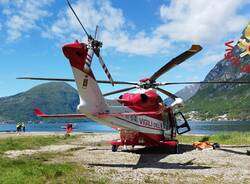Energy efficiency is the first fuel of a business
A report on energy efficiency has been published by UNIVA; it is a genuine operating manual for businesses, and is clear and easy to consult.

“As light as air” as the saying goes. But when the air is compressed and there are leaks in the system, if no remedial action is taken, this lightness can weigh considerably on a business’s balance sheet. The table published in the 2016 Report, “Energy efficiency: cases and experiences,” produced by the UNIVA Study Centre, LIUC University and SPI Power, speaks clearly: the 46 engineering companies, to which this type of investment was recommended, would make an annual saving of €800,000, with a total investment of €306,000, and a return on investment in just 4 months.
Air Leak is just one of the eleven technologies described in the Report, that can be made energy efficient. In fact, it would be better to talk about an operating manual, rather than a report, because it is clear and easy for a businessperson to consult. Its one hundred pages contain: the reference framework, the description of the individual technologies (understandable even for a beginner), the analysis of data relating to the 125 production sites of 84 businesses located along the Pedemontana motorway, which operate in seven different sectors (engineering, textile, chemical-pharmaceutical, paper and printing, rubber and plastics, food, and other).
IT IS BETTER TO BE EFFICIENT. The writers of the Report calculated that, with investments totalling €27.4 million, the 125 production sites analysed could make energy savings of €11.2 million per year. This means that the investment would be paid back in less than two years. “Calculating with a pay-back of more than 4 years is very complicated today,” explained Fabio Tarocco of SPI Power. “For example, of the interventions most recommended to businesses, 110 out of 125, that underwent analysis, there is the one for lighting systems, which has an average pay-back of 3.2 years. But what is interesting is that many if the companies analysed had already made or planned some of the interventions recommended by our analysis, which means that businesses are more aware of these topics.”
WE SHOULD CONSUME LESS ENERGY – For many years, the theme of energy cost has been at the heart of the policies of Varese industrialists, and can be summed up in three fundamental stages: the founding, in 1999, of the consortium Energi.VA, the founding, in 2003, of Espansione Srl, with which UNIVA became involved in the market, and the formation, in 2011, of SPI Power, the energy branch of the industrialists’ service company. “This study has identified, analytically, the ability of a company to use less energy with the same, end production,” explained Riccardo Comerio, the President of UNIVA. “At a time when energy commodities have reached their lowest prices, in order to impact on costs and on business competitiveness, we have to consume less.”
Consuming less also means reducing the impact on the environment. “Making your company more energy efficient, means making a financial saving, reducing fewer emissions, and having an industry that has less impact, in other words, that is sustainable,” said Massimo Raboni, a lecturer at the LIUC University.
IF YOU KNOW, YOU CAN INVEST – Federico Visconti, who never misses a chance to reiterate his corporate faith, referred to a 2002 article by the economist Claudio Dematté, entitled “Managing a business when the market becomes uncertain and difficult”. During a phase like this, according to the dean of the LIUC University in Castellanza, where uncertainty and difficulties have increased significantly, management should lead a businessperson, who often concentrates on other things, to reflect on these aspects. “In this respect, the Report provides training and education, and is provocative,” Visconti said.
And maybe the most evident provocation is that emphasised by Marco De Battista from UNIVA, who quoted a sentence in the report by the International Energy Agency. “The role of energy efficiency is as the first fuel, as much as any other energy resource, and it can contribute to the most important challenges, such as energy safety, sustainability and economic development.”
La community di VareseNews
Loro ne fanno già parte
Ultimi commenti
flyman su Ilaria Salis candidata alle europee con Alleanza Verdi Sinistra nel collegio NordOvest
Alberto Gelosia su Ilaria Salis candidata alle europee con Alleanza Verdi Sinistra nel collegio NordOvest
lenny54 su I no vax sono tornati a colpire in provincia: imbrattati i muri della redazione di Varesenews
malauros su I no vax sono tornati a colpire in provincia: imbrattati i muri della redazione di Varesenews
Felice su I no vax sono tornati a colpire in provincia: imbrattati i muri della redazione di Varesenews
PaoloFilterfree su A Varese Salvini prova a ricucire passato e futuro della Lega, ma Bossi non c'è














Accedi o registrati per commentare questo articolo.
L'email è richiesta ma non verrà mostrata ai visitatori. Il contenuto di questo commento esprime il pensiero dell'autore e non rappresenta la linea editoriale di VareseNews.it, che rimane autonoma e indipendente. I messaggi inclusi nei commenti non sono testi giornalistici, ma post inviati dai singoli lettori che possono essere automaticamente pubblicati senza filtro preventivo. I commenti che includano uno o più link a siti esterni verranno rimossi in automatico dal sistema.